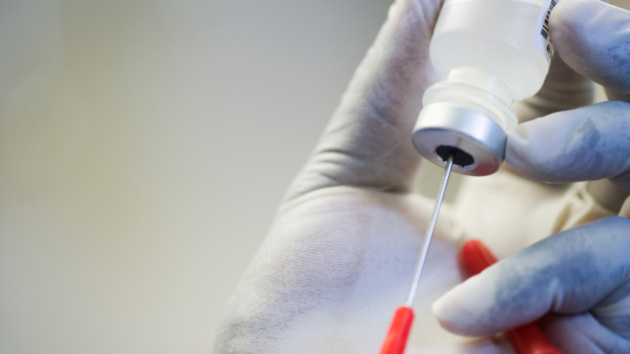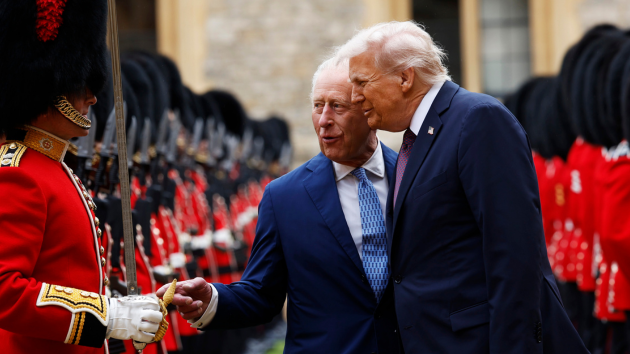Why doctors say the birth dose of the hepatitis B vaccine is still necessary
Written by ABC Audio. All rights reserved. on September 18, 2025

(NEW YORK) — Ahead of a key meeting amongst the Centers for Disease Control and Prevention (CDC) vaccine advisors — now with 12 members hand-picked by health secretary Robert F Kennedy Jr. — doctors, health officials and advocates are raising alarms that the panel could reverse a decadeslong guideline of vaccinating infants against hepatitis B at birth.
On camera on Wednesday, Republican Sen. Bill Cassidy, a doctor specialized in treating liver diseases and chair of the Senate committee that oversees the Department of Health and Human Services (HHS), said the American people should not have confidence in the advisory panel’s decision if they recommend against the birth dose of the hepatitis B vaccine.
The Advisory Committee on Immunization Practices (ACIP) is scheduled to meet Thursday to discuss the hepatitis B vaccine recommended at birth, a shot that decades of research has shown is safe and has virtually eliminated hepatitis B among babies in the United States.
At the last ACIP meeting in June, the advisory panel casted doubt about the necessity of the hepatitis B shot recommended at birth to all babies, comments that sparked concern among physicians.
In testimony on Wednesday, ousted CDC Director Susan Monarez said she was fired because she refused to rubber-stamp future changes Kennedy wished to make to the childhood vaccine recommendations, without a careful review of the evidence herself.
On Thursday, ACIP plans to discuss the hepatitis B birth dose and is expected to vote on a new recommendation, according to a draft of the meeting agenda.
Doctors and advocates told ABC News that the hepatitis B birth dose is still an essential recommendation and delaying it may lead to gaps in insurance coverage, growing health disparities, confusion and an increase in preventable hepatitis B infections.
Doctors call the hepatitis B vaccine ‘one of the cornerstones’ of prevention
In a Senate hearing on Wednesday, Republican Sen. Bill Cassidy praised the success of the recommendation to give babies a hepatitis B vaccine at birth.
“Before 1991, as many as 20,000 babies, babies, were infected with hepatitis B in the United States of America, and that changed when the hepatitis B vaccine was approved for newborns,” Cassidy said.
“Now fewer than 20 babies per year get hepatitis B from their mother. That is an accomplishment to make America healthy again, and we should stand up and salute the people that made that decision, because there’s people who would otherwise be dead if those mothers were not given that option to have their child vaccinated.”
“The hepatitis B birth dose is one of the cornerstones of our hepatitis B prevention policy,” Dr. Sean O’Leary, an infectious disease specialist and chair of the American Academy of Pediatrics committee on infectious diseases, said in a press briefing following the last ACIP meeting in June.
The CDC currently says a timely administration of a hepatitis B vaccine is essential to help prevent transmission of the virus from mother to child at birth. While efforts to test for this virus during pregnancy have improved detection, cases can still be missed, or documentation may be inaccurate or incomplete.
Doctors and public health experts said that the hepatitis B shot is currently recommended for all babies at birth because the risk if a baby is missed is too high.
“A child that is infected at birth has a 90% chance of going on to develop chronic active hepatitis B. Of those children, of those 90%, 25% of them will then go on to die of the disease,” O’Leary said.
The first hepatitis B vaccine was licensed in 1981, and the ACIP recommended a vaccine dose universally for all babies in 1991. The hepatitis B birth dose “acts as a safety net, reducing the risk for perinatal transmission when the [hepatitis B] status of the parent is either unknown or incorrectly documented at delivery,” the CDC said.
“Because the stakes were so high, because you’re so much more likely to get cirrhosis or liver cancer if you get this virus as a young child, that’s why [there’s a] birth dose,” Dr. Paul Offit, director of the Vaccine Education Center and professor of pediatrics in the Division of Infectious Diseases at Children’s Hospital of Philadelphia, told ABC News. “We did a dramatic job of virtually eliminating the disease in young kids.”
Doctors say a risk-based hepatitis B vaccine strategy didn’t work in the past
Before 1991, hepatitis B shots were only given to infants considered high risk; however, this strategy missed many cases.
“Four to five decades of implementation science shows us that risk-based vaccine recommendations in this case, don’t work,” Chari Cohen, DrPH, MPH, president of the Hepatitis B Foundation, told ABC News.
“We were not very good at identifying all kids at high risk as there were other factors for which we were not accounting and because of imperfections in the system,” Dr. Gary Freed, a professor of pediatrics, health management and policy at the University of Michigan, told ABC News.
“To make sure no high-risk infants were missed, a universal hepatitis B vaccine strategy was adopted,” Freed told ABC News.
In 1999, there was a temporary pause in the universal recommendation, in favor of a risk-based recommendation for a brief period that year. At least one child in Michigan died of hepatitis B infection that year, who was missed, according to a CDC MMWR report, due to improper documentation.
Cohen said the birth dose doesn’t just protect babies from getting the virus from their mother but protects babies from getting it through close contacts who may not know they are infected.
“You only have 24 hours to save a baby from getting Hepatitis B if they’re born to a positive mom. However, you’re also trying, trying to prevent early childhood exposure, especially among families who don’t know that there’s a family member or a caregiver that has hepatitis B,” Cohen said.
Dr. Su Wang, a primary care doctor and person living with chronic hepatitis B who is a spokesperson for the Hepatitis B Foundation, knows how easily people can get missed from both sides of the healthcare system.
“We certainly cannot count on our system in the U.S., the way it is, our broken healthcare system to actually even identify those who are at risk, much less those who don’t have an identified risk. You just couldn’t imagine all the different ways that people can fall through the cracks,” Wang said.
“It’s a huge burden on somebody to have to have [hepatitis B] for the rest of their life, especially if it starts in childhood,” Wang said. “You could prevent all that with a simple vaccine.”
Wang learned she was living with hepatitis B when she tried to donate blood in college and later found out that she likely contracted the virus from a family member when she was a baby.
“This does happen, household transmission,” Wang said. “When I think about my case, I think the birth dose is something that would have helped me.”
Ending the recommendation may also worsen health disparities
On Tuesday, American health insurers pledged to cover the cost of all vaccines based on previous recommendations by the ACIP that were in place as of Sept. 1. While this may protect access for many kids with private health insurance, it may leave a critical gap for kids who rely on no-cost vaccines through the Vaccines for Children Program (VFC), if the recommendation is reversed.
The CDC said over half of all American kids were eligible for shots through the VFC program in 2023. If ACIP no longer recommends a hepatitis B shot at birth, a majority of these kids may lose access.
“Fifty percent of newborns who are going to be eligible for Vaccines for Children may not have the vaccine any longer available to them,” Michaela Jackson, MS, program director of prevention policy for the Hepatitis B Foundation, told ABC News. “Policy changes can seem very, very small on the surface, but they have long-reaching impacts on the ground.”
Hepatitis B rates have improved but remain a ‘silent epidemic’
The recommendation for all babies to get the hepatitis B shot at birth has virtually eliminated this disease in young kids, but the virus still remains a “silent epidemic” in the U.S., Offit said.
Before universal vaccination at birth, it was estimated that 200,000-300,000 new hepatitis B infections occurred annually in the U.S. from 1980-1991 and over 1 million people were living with chronic hepatitis B infection, who were potentially infectious to others.
CDC data shows that there were at least 2,214 reports of acute hepatitis B cases in the U.S. in 2023, which corresponds to an estimated 14,400 acute infections with the virus, after adjusting for unrecognized or underreported infections. There were over 17,000 newly reported chronic hepatitis B cases and nearly 1,800 hepatitis B-related deaths that year.
It’s estimated that up to 2.4 million people are living with chronic hepatitis B in the U.S., many asymptomatic and unaware of their diagnosis.
“There’s a lot more hepatitis B in this country than we people realize. Risk is much higher than people know it is,” Cohen said.
The virus is contagious and spreads through contact with blood or body fluids from a person infected with the virus, according to the CDC. A person can be asymptomatic for many years and spread the infection.
There are medications people can take to slow down the virus, but there’s no cure.
“Until we have a cure for Hepatitis B, it is critically important to prevent it,” Cohen said.
The Hepatitis B Foundation has voiced grave concern that the recommendation for universal hepatitis B vaccination at birth will be reversed by the current ACIP.
“For decades, the birth dose recommendation has prevented thousands of Americans from a devastating and life-threatening illness. It is a critical part of our nation’s strategy to eliminate hepatitis B and protect the health of future generations,” the foundation said in a statement in June.
The organization called for a “zero-tolerance policy for perinatal hepatitis B transmission in the U.S.”
“We cannot allow a preventable, cancer-causing virus to destroy more lives. The health of our children and the integrity of our public health system deserve better,” the statement said.
In a letter to the ACIP ahead of Thursday’s meeting, the pharmaceutical company Merck, which makes one of the FDA-approved hepatitis B vaccines that can be given at birth, said 330 million doses of its shot have been distributed worldwide since its approval in 1986 and “have been evaluated in over 30 clinical studies enrolling approximately 13,000 participants.
Among these studies, 12 post-approval studies included 3,646 neonates, newborns, infants and children.”
“The safety profile of RECOMBIVAX HB has been well established and closely monitored for more than 35 years. Merck remains vigilant in monitoring scientific literature, healthcare reports and other data sources to ensure the continued safety of RECOMBIVAX HB,” Merck said.
Wang said $0.20 per shot could prevent a lifetime of suffering. “It’s not just a liver disease, you know, it affects your life completely.”
Copyright © 2025, ABC Audio. All rights reserved.





